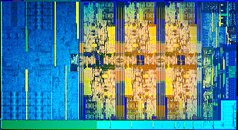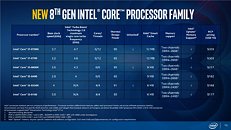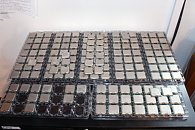Thursday, October 12th 2017
On Intel's Decision to no Longer Disclose All-core Turbo
Intel is no longer going to disclose all-core Turbo Boost speeds, starting with their 8th Gen Coffee Lake processors that have just been released. The information comes straight from the blue giant. Answering a query from ExtremeTech on the matter, the company said that "[W]e're no longer disclosing this level of detail as its proprietary to Intel. Intel only specifies processor frequencies for base and single-core Turbo in our processor marketing and technical collateral, such as ARK, and not the multi-core Turbo frequencies. We're aligning communications to be consistent. All Turbo frequencies are opportunistic given their dependency on system configuration and workloads."
This decision is a rollback that does little more than rob users of another data point that has really always been there. The practical effect of this change isn't anything to write home about: Intel's Turbo Boost capabilities were never guaranteed performance levels (the fact that the advertised Turbo speeds were called "Max Turbo" implied Turbo levels could be lower.) However, there's also not much that can be said to explain this change in stance from the blue giant. If anything, this decision only opens up debate and speculation regarding the reasons why Intel is making this change: and the skeptics among us will always default to foul play or dark linings.To our Forum dwellers: this piece is marked as an Editorial
For one, it could be said that Intel is doing this in order to unlock a lot more leeway in CPU binning. Absent all-core turbo speeds means that Intel now only has to guarantee two levels of performance for each of its chips: all-core base clocks (which for the 8700K, for example, is set at 3.7 GHz), and single-core Turbo (a more impressive 4.7 GHz). These are the only frequencies Intel now has to make sure all of their 8700K chips hit. This gives a whole new weight to the "silicon lottery" concept, in that now users can be saddled with the most basic 8700K that only achieves an all-core clock of just 3.7 GHz and not a switch more, or an amazing chip that hits 5.3 GHz easily.
Pore over Intel's ARK page, and now the 8700K processor is being listed as having a max Turbo frequency of 4.7 GHz - but that one frequency only really applies to single-core Turbo. So not only do Intel CPUs now look better to the unwary, distracted user (what, max 4.7 GHz on six cores, that's insane), but now there's also the chance of something like this happening: "So what if your unlocked K processor doesn't overclock a single MHz on all cores? We don't really specify it should be able to, do we?"To add to the confusion, it's also worth mentioning the "MultiCore Enhancement" option that most Intel motherboards ship with, which when enabled, overrides even Intel's previous maximum all-core Turbo Boost specs. Now, even if users and reviewers disable the option to find out what's Intel's rated (and now hidden) max Turbo Boost for any given processor, there's no guarantee that the frequencies achieved will be the same for all processors of the same product name. After all, different OC potential exists among chips according to die quality - and the fact that most motherboards now feature CPU voltages set on Auto should add to this scenario, with some CPUs requiring lower voltages to achieve higher clockspeeds than others, which theoretically, should mean different auto Turbo limits according to power consumption and thermal headroom. At the extreme of this situation, it might be impossible for reviewers to achieve parity on CPU reviews absent of disabling all-core Turbo features, since there won't be a baseline value they can consider: CPUs will be reviewed with all-core Turbos that are dependent on CPU quality and automated Turbo Boost. Unless all tech review sites agree on a globally accepted all-core Turbo speed, but that's slightly utopian, at the very least.Skepticism aside, the main issue here, I feel, is that the decision was made without any clear focus or mention as to why. Now yes, Intel might not have any shady reason for doing this - but nevertheless, there is a reason behind this decision; otherwise, the company just wouldn't make the move. All of the above scenarios are result of one thing only: the absence of clear communication, which ends up with users scratching their heads at a seemingly opaque decision.
Sources:
ExtremeTech, Intel ARK
This decision is a rollback that does little more than rob users of another data point that has really always been there. The practical effect of this change isn't anything to write home about: Intel's Turbo Boost capabilities were never guaranteed performance levels (the fact that the advertised Turbo speeds were called "Max Turbo" implied Turbo levels could be lower.) However, there's also not much that can be said to explain this change in stance from the blue giant. If anything, this decision only opens up debate and speculation regarding the reasons why Intel is making this change: and the skeptics among us will always default to foul play or dark linings.To our Forum dwellers: this piece is marked as an Editorial
For one, it could be said that Intel is doing this in order to unlock a lot more leeway in CPU binning. Absent all-core turbo speeds means that Intel now only has to guarantee two levels of performance for each of its chips: all-core base clocks (which for the 8700K, for example, is set at 3.7 GHz), and single-core Turbo (a more impressive 4.7 GHz). These are the only frequencies Intel now has to make sure all of their 8700K chips hit. This gives a whole new weight to the "silicon lottery" concept, in that now users can be saddled with the most basic 8700K that only achieves an all-core clock of just 3.7 GHz and not a switch more, or an amazing chip that hits 5.3 GHz easily.
Pore over Intel's ARK page, and now the 8700K processor is being listed as having a max Turbo frequency of 4.7 GHz - but that one frequency only really applies to single-core Turbo. So not only do Intel CPUs now look better to the unwary, distracted user (what, max 4.7 GHz on six cores, that's insane), but now there's also the chance of something like this happening: "So what if your unlocked K processor doesn't overclock a single MHz on all cores? We don't really specify it should be able to, do we?"To add to the confusion, it's also worth mentioning the "MultiCore Enhancement" option that most Intel motherboards ship with, which when enabled, overrides even Intel's previous maximum all-core Turbo Boost specs. Now, even if users and reviewers disable the option to find out what's Intel's rated (and now hidden) max Turbo Boost for any given processor, there's no guarantee that the frequencies achieved will be the same for all processors of the same product name. After all, different OC potential exists among chips according to die quality - and the fact that most motherboards now feature CPU voltages set on Auto should add to this scenario, with some CPUs requiring lower voltages to achieve higher clockspeeds than others, which theoretically, should mean different auto Turbo limits according to power consumption and thermal headroom. At the extreme of this situation, it might be impossible for reviewers to achieve parity on CPU reviews absent of disabling all-core Turbo features, since there won't be a baseline value they can consider: CPUs will be reviewed with all-core Turbos that are dependent on CPU quality and automated Turbo Boost. Unless all tech review sites agree on a globally accepted all-core Turbo speed, but that's slightly utopian, at the very least.Skepticism aside, the main issue here, I feel, is that the decision was made without any clear focus or mention as to why. Now yes, Intel might not have any shady reason for doing this - but nevertheless, there is a reason behind this decision; otherwise, the company just wouldn't make the move. All of the above scenarios are result of one thing only: the absence of clear communication, which ends up with users scratching their heads at a seemingly opaque decision.





89 Comments on On Intel's Decision to no Longer Disclose All-core Turbo
It's quite likely they wanna have their cake & eat it too i.e. pretend that their CPU's are 95W/65W TDP & have them OC right out of the gate, unfairly skewing many reviews in their favor.
-edit-
Unless you were theorizing per-chip maximums. If so, then I see your point. Seems far-fetched, but I wouln't put anything past {insert major company name here}.
I would not call the move shadey but i would call the lack of reason or info shadey as is the less obvious though noted review stability across site's.
Did some have what ill call mobo overide boost on (multicore enhancement) , not officially supported by intel hence skewing its performance.
Forget the competition in this as it's irrelevant.
We all know how confusing intels sockets and chip lineup is now and that's an enthusiast community, average Joe's are definitely being smoke and mirrored by intel on a regular basis these days.
By that i mean i expect a few will swap 7700k or ryzen 7 for this expecting far more then they will really get ,not knowing as much as tpu community and all.
And time and again intel are not being realistic to customers about cooling requirements or throttle response, many will take intels 5ghz on air pr and melt some stuff not realising or be on here moaning about getting a 240 aio(at best) only to see high temps still.
Adored did a video on MCE, showing that there is a large delta in the performance of the exact same chip between reviewers on just the stock settings.
Yes, multicore turbo clocks cannot be guaranteed because some people run heavy AVX2 code which makes the CPU consume the most power, vs. some very light integer loads which don't stress the CPU as much.
Between these two scenarios there's a huge difference in power consumption and power constraints which means that it's become meaningless to specify turbo clocks for more than a single core due to the increased number of cores which have very little room to dissipate heat.
Bear in mind their automatic overclocking called turbocore whether single or multicore still depends on how well cooled a chip is. That tells me at a certain ambient temp with the stock cooler the cpu will reach a certain core speed, where as a better cooler may make it go further, and it depends on what motherboard you use.
Also chip lotto still plays big as it did with mine as most 8350s need water to break 5.0GHz on all cores where as mine doesn't.
Intel is just trying to lock down IP to prevent AMD from getting an Upperhand since they had a considerable jump in Core counts with threads and clock speeds that are amazing across the board.
Honestly this affects the average joe more so than the old school overclocker.
Let's say that I am buying a six core 8700 after reading TPU's review where the reviewer says that he observed the processor running at up to 4.3GHz with all cores. 4.3GHz is great and probably enough to make you ignore the extra potential of the K model and also make the CPU looking better compared to a Ryzen 7.
What happens if the reviewer's CPU was a golden sample? What if my CPU can't go higher than 4.0GHz with all cores?
Nobody is being cheated. The Ryzen chips are the exact same. It seems common sense to control quality when the processes get harder to master.
If we want to talk about overclocking on all cores then that's what enthusiasts get to play with. I don't get the fuss, they tell us a number yet we want another certainty. My 3930k didn't have any of that stuff going on.
It is a silicon lottery. There's only so much a company can guarantee on quality control.
I wonder how much of a different reaction this was to get if AMD had said this before Intel ever did...
The reason behind this move is a fairly easy one to understand. If we take, for example, the 18 core CPU, it has a lot of intermediary frequencies depending on the number of cores being taxed at a certain time: 4.2GHz for 2 cores, 4.0GHz for 4 cores, 3.9GHz for 12 cores, 3.5GHz for 16 cores and 3.4GHz for 18 cores. And the maximum turbo clock is 4.4GHz. The sad thing is that this is a fact known by very few. These are consumer parts, and consumer workloads vary a lot, and consumer software is, for the most part, VERY poorly optimised. In most cases we're lucky if we're using 4 to 6 cores. So, the all core turbo becomes less important than certain intermediary turbo levels.
Another reason would be configurable TDP levels via the UEFI BIOS. Large system integrators will set different TDP levels depending on their designs (power/cooling). Something that will be invisible to the user, but will affect all the intermediate turbo levels, rendering them irrelevant.
As for the consumer boards out there, I know that at least ASUS ignores the all core turbo, since their MCE (multi core enhancement) makes the single core max turbo effectively the all core turbo. Other manufacturers also do this. Gigabyte doesn't, but it's going to, soon, if they want to stay competitive.
Theres already a big thread discussing this.
Because if a game uses all cores plus Avx and isn't cooled beyond its thermal output it's going to throttle badly , and on odd cores ie per core ,which won't be pretty.
People need to do their homework already buying intel , it's just nicer to have all the info , and nicer still when it's sound info, bar TPU's (methods fine guys educated) review id be unsure of others methods.
Wake up, Intel is after all Intel. Don't think for an second they're not doing this with full intent on deceiving customers. It's a smart in-direct deception, but still, it is one.
It seems more like they are.
1) Binning with more flaws and higher voltages. Salvage more dies that have higher power consumption, or lower clock potential.
2) Screwing with overclockers.
3) Protecting their product. Preventing overclocking on more boards.
4) Trying to make more money. People will be pushed to buy higher priced parts to ensure performance.